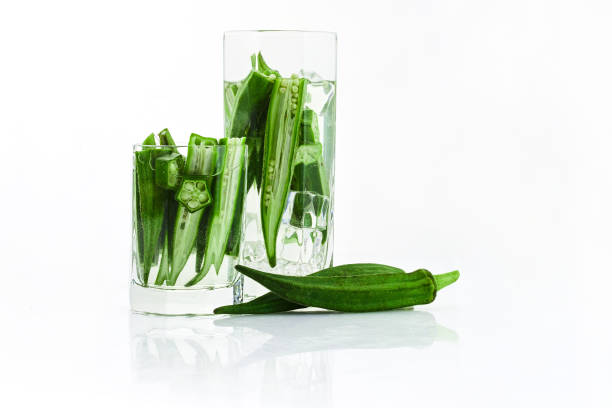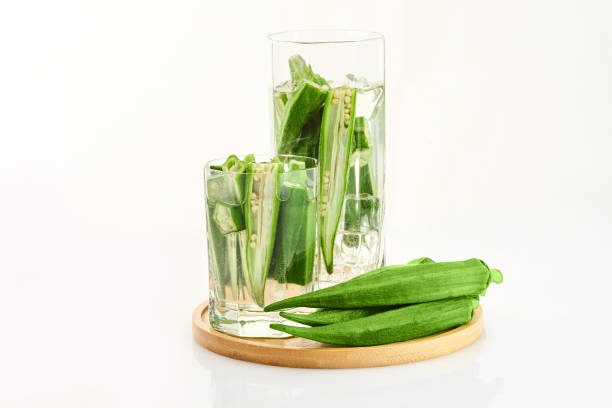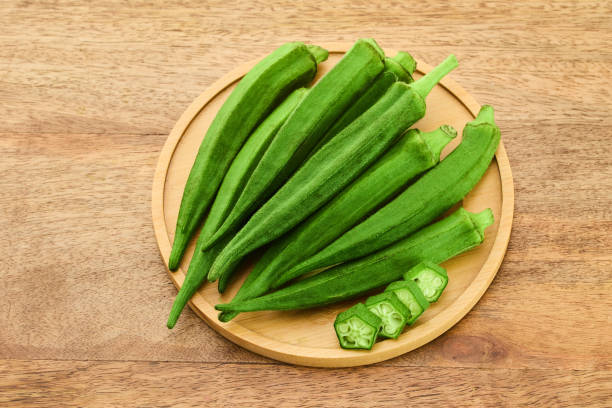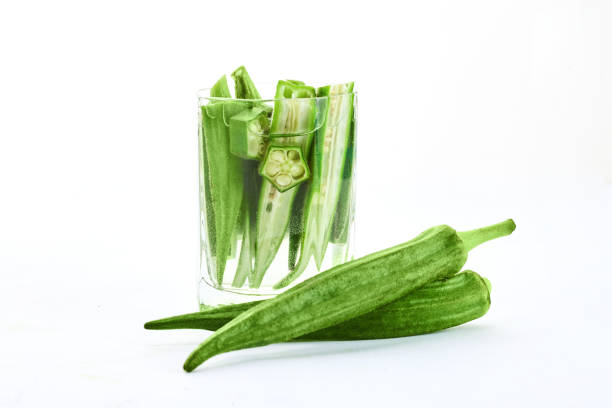Is raw okra water really the new superfood If you’ve scrolled through Instagram or YouTube lately, you’ve probably seen someone holding a glass of cloudy green liquid, proudly calling it bhindi water, okra water or lady finger detox drink. Influencers swear it melts belly fat, clears acne, balances sugar, boosts immunity, and maybe even helps you ace a job interview (okay, not that last one… yet).
But before you start slicing bhindi pods and soaking them overnight, let’s pause. Is this gooey drink really the new superfood or just another fleeting internet health craze? Bhindi is already a beloved Indian vegetable, famous for its crunchy texture and nutrient-rich profile. Turning it into a slimy overnight infusion, though, is where curiosity meets comedy. Let’s chew through the hype and sip the science.
What Exactly Is Bhindi Water and Why Is It Trending
Bhindi water is basically a simple kitchen experiment. Fresh okra pods are washed, lightly salted, sliced, and soaked in drinking water for 8 to 24 hours. By morning, the water takes on a slightly sticky texture thanks to mucilage—the same slippery substance that makes okra “slimy” in curries. Social media claims this slime is pure magic, loaded with nutrients that your body can drink directly.
Videos show people gulping it down like a miracle tonic for everything from weight loss to glowing skin. The idea is that instead of eating bhindi, you drink the essence. Sounds like a time saver, right? But remember: virality doesn’t always equal validity. Just because your neighbour’s cousin’s friend swears by it doesn’t mean it’s a verified superfood
Bhindi’s Real Nutritional Powerhouse
Here’s where things get interesting—because bhindi is genuinely healthy. A 100-gram serving of raw okra is low in calories yet rich in vitamins and minerals. It contains Vitamin C for immunity, Vitamin K for blood clotting, folate for cell repair, Vitamin B6 for brain health, manganese for metabolism, and a decent amount of thiamin. It’s practically a multivitamin wearing a green coat.
Bhindi is also packed with polyphenols, powerful antioxidants known to reduce inflammation, support heart health, and help manage cholesterol and blood pressure. Its famous mucilage acts as a prebiotic, feeding good gut bacteria and aiding digestion. So yes, eating bhindi in your meals is a great idea. The question is—does simply soaking it in water pass along the same benefits

The Slime Science: Can Nutrients Really Leak Into Water
Here’s the tricky part. While okra contains all those amazing nutrients, there’s little scientific evidence that these vitamins and polyphenols actually dissolve into plain water. Nutrients like Vitamin C are water-soluble, but we don’t know how much transfers in just a few hours of soaking. Experts say no peer-reviewed studies confirm that bhindi water provides the same nutritional punch as the vegetable itself.
What you mostly get is hydrated mucilage—a slightly viscous drink that may help coat the stomach and support gut bacteria. That’s nice, but not the dramatic “diabetes reversal” or “weight loss miracle” promised on social media. It’s a fun kitchen experiment, not a replacement for balanced meals
Potential Health Perks: Hydration With a Side of Fiber-ish Goodness
Even though bhindi water might not be a nutrient goldmine, it isn’t useless either. Infused vegetable water can encourage people to drink more fluids, improving hydration. The mild prebiotic effect of mucilage might soothe the digestive tract and help with occasional acidity or bloating. Some users report a slight calming effect on the stomach, which could make mornings more comfortable.
Think of it like cucumber water or lemon water—refreshing, mildly beneficial, but not a magic potion. If bhindi water motivates you to stay hydrated instead of reaching for sugary sodas, that’s already a win. Just don’t expect it to melt fat while you binge-watch your favorite series

Bhindi Water and Diabetes: Hype vs Reality
Many viral posts claim bhindi water benefits people with diabetes by lowering blood sugar. True, studies on whole okra pods show that the soluble fiber may slow glucose absorption. But research on okra water specifically is nearly nonexistent. The small amount of mucilage in infused water might offer minimal blood sugar support, but it’s nowhere near the effect of actually eating the vegetable, which provides fiber bulk.
Doctors caution against replacing prescribed diabetes medication with trendy drinks. At best, bhindi water can be a supportive habit alongside a healthy diet, regular exercise, and medical guidance—not a cure or standalone treatment
Clear Skin, Strong Immunity, and Weight Loss: What’s Proven
The glow-up claims are tempting: drink bhindi water, wake up with glass skin and a smaller waist. But science says otherwise. While antioxidants in okra help combat free radicals, there’s no evidence that soaking pods in water extracts enough of these compounds to transform your skin overnight. Weight loss, similarly, comes down to calorie deficit, not a single drink.
That said, if bhindi water replaces sugary beverages, you’ll naturally cut calories and maybe shed a few pounds. Better hydration can also plump skin and reduce dullness. So yes, indirect perks are possible—but they’re lifestyle-driven, not bhindi-magic
The Fun Factor: Slimy but Surprisingly Refreshing
Let’s be honest—the texture of bhindi water is… unique. Some call it silky, others call it snotty (we’re looking at you, okra skeptics!). The slime comes from soluble fiber and is harmless, even soothing. Fans say the slight thickness gives a natural fullness, reducing midnight snack cravings. If you can handle the texture, it might become your quirky new habit—like kombucha without the price tag

How to Make Bhindi Water at Home (Without a Science Degree)
Curious enough to try? Here’s a simple method:
- Wash 3–4 fresh bhindi pods thoroughly.
- Slice off the ends and cut them lengthwise.
- Soak in a glass of clean drinking water for 8–24 hours.
- Remove the pods and drink the water on an empty stomach.
You can add a squeeze of lemon or a pinch of pink salt for taste. Avoid boiling—heat may destroy delicate compounds and increase slime to unholy levels.
Expert Verdict: Healthy, Yes. Miraculous, No.
Nutritionists agree that bhindi water benefits are mostly about hydration and mild digestive support. Eating whole okra gives far greater fiber, vitamins, and antioxidants. There’s no harm in sipping the infused water as long as you see it as a bonus, not a medical treatment. Combine it with balanced meals, regular workouts, and less junk food for real results.
One long, refreshing glass of bhindi water won’t reverse diabetes, but paired with healthy habits, it can be part of a supportive lifestyle. Think of it as a fun accessory to your wellness wardrobe, not the main outfit.
The Bottom Line: Sip Smart, Stay Skeptical
The internet loves a quick fix, and bhindi water is the latest star of the “miracle drink” stage. But the truth is refreshingly simple: bhindi water benefits are modest at best. Enjoy it for its hydration, gut-friendly slime, and Instagram-worthy green glow—but don’t expect overnight transformations.
So, go ahead and soak those pods if you’re curious. Drink it chilled, make funny faces at the slimy texture, and laugh while you sip. Because health trends may come and go, but a balanced diet, regular movement, and a sense of humour will always be superfoods that never go out of style.
Health Benefits Of Chewing Elaichi At Night
Disclaimer
The tips and suggestions mentioned in this article are intended for general informational purposes only. Before starting any fitness program, making changes to your diet, or trying any remedies related to health conditions, please consult your doctor or a qualified healthcare professional. Dr. You does not verify or endorse the authenticity of any such claims made herein

